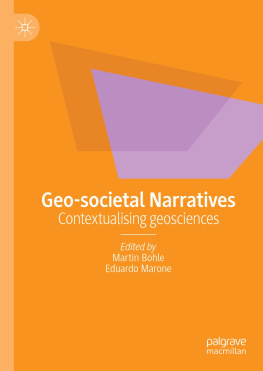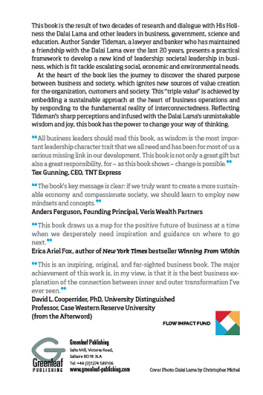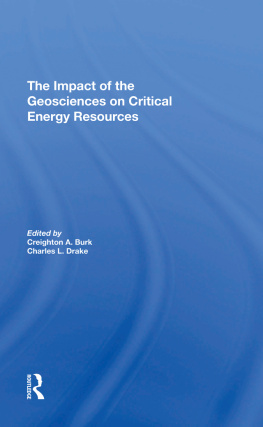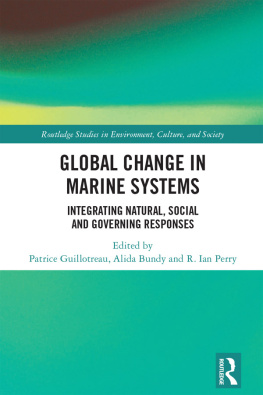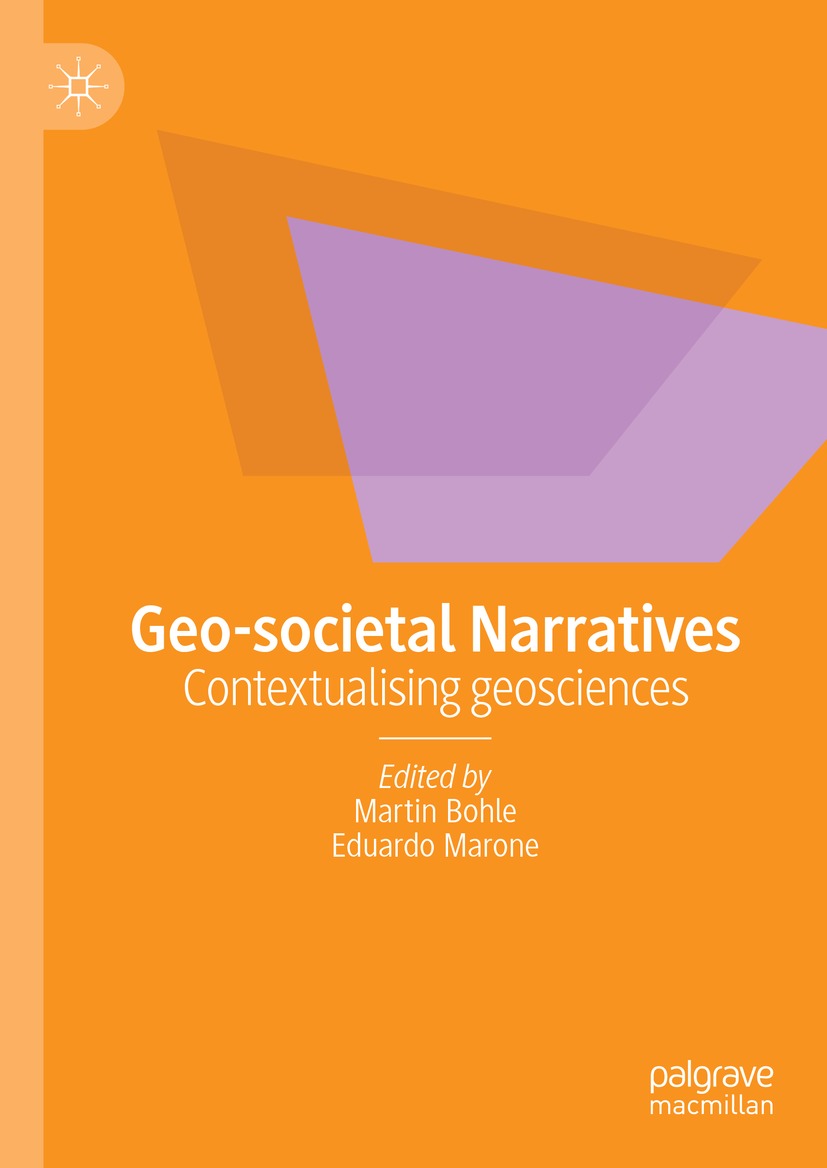Editors
Martin Bohle and Eduardo Marone
Geo-societal Narratives
Contextualising geosciences
1st ed. 2021

Logo of the publisher
Editors
Martin Bohle
Ronin Institute for Independent Scholarship, Montclair, NJ, USA
International Association for Promoting Geoethics (IAPG), Rome, Italy
Eduardo Marone
International Association for Promoting Geoethics (IAPG), Rome, Italy
Centre for Marine Studies, Federal University of Paran, Curitiba, Brazil
International Ocean Institute Training Center for Latin America and the Caribbean (IOITCLAC), Pontal do Paran, Brazil
ISBN 978-3-030-79027-1 e-ISBN 978-3-030-79028-8
https://doi.org/10.1007/978-3-030-79028-8
The Editor(s) (if applicable) and The Author(s), under exclusive license to Springer Nature Switzerland AG 2021
This work is subject to copyright. All rights are solely and exclusively licensed by the Publisher, whether the whole or part of the material is concerned, specifically the rights of translation, reprinting, reuse of illustrations, recitation, broadcasting, reproduction on microfilms or in any other physical way, and transmission or information storage and retrieval, electronic adaptation, computer software, or by similar or dissimilar methodology now known or hereafter developed.
The use of general descriptive names, registered names, trademarks, service marks, etc. in this publication does not imply, even in the absence of a specific statement, that such names are exempt from the relevant protective laws and regulations and therefore free for general use.
The publisher, the authors and the editors are safe to assume that the advice and information in this book are believed to be true and accurate at the date of publication. Neither the publisher nor the authors or the editors give a warranty, expressed or implied, with respect to the material contained herein or for any errors or omissions that may have been made. The publisher remains neutral with regard to jurisdictional claims in published maps and institutional affiliations.
This Palgrave Macmillan imprint is published by the registered company Springer Nature Switzerland AG
The registered company address is: Gewerbestrasse 11, 6330 Cham, Switzerland
This book is dedicated to the philosopher and physicist Mario Bunge (19192020). He inspired us with his imperative Enjoy life and help live. We learnt from him the rebellious character of philosophy and how much it must be linked with the best of up-to-date science. He also inspired us to edit this book, following his idea of a morally neutral science but reminding us that social science shows that some moral codes are better than others. We are happy with his call to give society something in exchange for the education we were getting. Engaged by Bunges vision of tolerance regarding all authentic philosophies, we wish to promote a rational debate among them. As big questions come in bundles, we tried to tackle them systematically and systemically because:
A philosophy without ontology is invertebrate; it is acephalous without epistemology, confused without semantics, and limbless without axiology, praxeology, and ethics.(i)
The Editors, 31 March 2021
(i) Bunge, M. (2016). Between Two Worlds: Memoirs of a Philosopher-Scientist. Springer Biographies, Springer, 496 p. (p. 406).
The dedication uses excerpts from an interview published online at Wissenschaft & Kommunikation (https://a-g-i-l.de/mario-bunge-the-big-questions-come-in-bundles-not-one-at-time/) by H.W. Droste (accessed 23 February 2021).
Foreword
Geosciences , in the sense of the science of the Earth system , have many roots with a variety of cultures, perceptions of what role the science should and does play, how its internal organisation is set up, how the interaction with neighbouring fields takes place, and, in particular, how the sciences are responding to societal expectation, and how they perceive their role in guiding societies in making the world a better place.
The classical field of geosciences is geology, which helped understand how Earth came into its present being and what massive changes it has undergone. The timescales of these geological dynamics are usually very long, and people with their relatively brief history have no role in these dynamics. However, the added value of geological knowledge in assessing significant geo-risks and providing access to minerals and energy is of immediate importance to societies.
Another classical field of geoscience is geography , which deals primarily with the inhabited world. It is the traditional field, dealing with the interaction of Earth and people, less so as biological species than carriers of culture, and giving people meaning of the Earth. For a long time, it was mostly a description of stationary conditions, as manifested in climatic determinism concepts, but also of significant importance to history and policymaking, for instance, when linked to colonialism.
At the other end of natural sciences, contributing to Earth science are biology and ecosystem sciences, which have unveiled a wonderland of complexity, non-linearity and high-dimensionality of ecosystems and their responses to not only anthropogenic pressures. Their timescales are primarily of the order of a few years, sometimes several decades of years.
These sciences have contributed to shifting at the centre of public attention the societal concern towards the state and change of the environment, at least in the West. Examples include the Club-of-Rome process, with the expectation of running out of resources, with Waldsterben (perishing of forests because of acid rain) and the expectation of accelerating extinctions, the opposition to the use of nuclear energy. Usually, humanities (Geisteswissenschaften), in this book referred to people-sciences , were hardly involved. The self-role of humanities to act as critical commentators and sense-makers mainly was compromised by an adherence to the Zeitgeist. However, science and technology studies (STS) emerged and began to understand natural sciences, as done by actors, that sciences are social processes [1].
The situation changed when climate science began its ascent. Driven primarily by theoretical physicists, supported by meteorologists and oceanographers, this field developed vigorously and quicklyand has increasingly attracted the curiosity and attention of the public. The advent of the IPCC process accelerated the career of the climate change topic to become a central global political issue, with regular UN conference of the Parties, large and ubiquitous demonstration of Western youth, and an uninterrupted flow of commercial references that whatever product of daily life is climate-friendly or even climate-neutral.
The tasks of determining what the ongoing climate change looks like, how it is consistently explained (namely by the continued release of greenhouse gases into the atmosphere), and what the future may look like have since been answered and documented in the series of IPCC reports. Since then, more and other questions have arisen as to what could be the impact of these changes on ecosystems and societies, which measures are available to limit climate change, and which measure would allow meeting the celebrated

